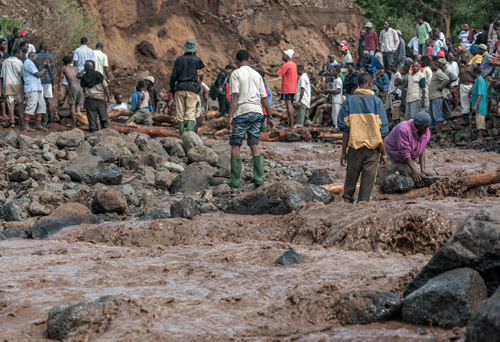
A new report shows that several countries will face high to extreme risks from the impacts of climate change in the next 12 years. The consequences “may pose a serious obstacle to sustainable economic growth in the world’s most commercially important cities.”
Meanwhile it has been announced that temperatures will reach new highs within a generation, a new study ranked those cities at more risk by evaluating their exposure to climate events, sensibility of the population and the capacity of their governments to respond to these kinds of issues.
The top 10 countries most at risks are:
#10 Ethiopia: After a year of severe floods in the country which destroyed most of the food crops, Ethiopia was ranked as the 10th country most vulnerable to climate change impacts.
#9 Philippines: Manila, capital of the Philippines, is one of the five cities in Asia which face “extreme risk” from climate change impacts, according to the report.
#8 Cambodia: Cambodia is among the southeast and south Asian countries tipped to face an increased risk of severe flooding due to projected changes in seasonal rainfall.
#7 Democratic Republic of Congo: The deforestation in the humid forests of Congo has put the country in the risk list of climate events and climate change impacts.
#6 Nigeria: Climate change is threatening food security and the health of the residents. Vulnerability and lack of response from the government to address this kind of issues are also responsible of this situation.
#5 South Sudan: As the main income of the country population is linked to the agricultural sector, changes in weather are expected to increase, putting the country at risk of flooding and higher risk of diseases due to poor healthcare access.
#4 Haiti: The extreme exposure to climate-related events, combined with poor healthcare access, weak infrastructure, high levels of poverty and an over-reliance on agriculture have led to the country being classified as at “extreme” risk.
#3 Sierra Leone: It has been reported that Sierra Leone is facing changing rainfall patterns which lead to exposure to climate disasters. Most of the population of Sierra Leone relies on farming so these changes would also lead to lower incomes.
#2 Guinea-Bissau: As most African countries, Guinea-Bissau is considered at risk due to their natural susceptibility to events such as floods, droughts, fires, storms and landslides. However, their high ranking is partly due to the vulnerability of the population, and the inadequacies of existing infrastructure to adapt to or tackle climate change challenges, because of weak economies, governance, education and healthcare.
#1 Bangladesh: The situation of Bangladesh is very concerning, since it was ranked as the country most vulnerable to climate change. Dhaka, its capital, is the world’s most vulnerable city, due to its exposure to threats such as flooding, storm surge, cyclones and landslides, as well as its susceptible population and weak institutional capacity to address the problem.

